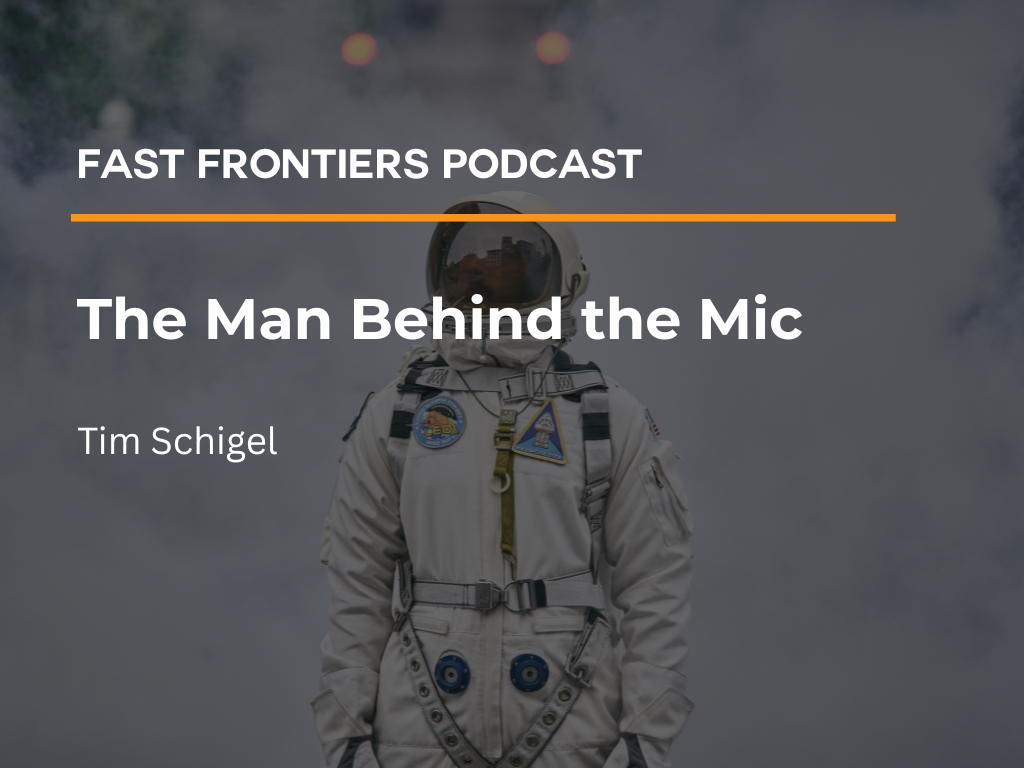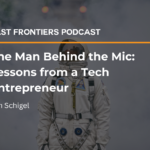Recently on Fast Frontiers, we switched things up a bit as guest interviewer Joe Kaiser, Growth Equity Investor at Mercato Partners, puts the founder of both Fast Frontiers and Refinery Ventures, Tim Schigel, behind the mic.
We aptly call this two-part series of the podcast “The Man Behind the Mic.” In it, we delve into many areas, including the origins story of Fast Frontiers, Tim’s journey, and what Refinery Ventures is all about.
Fast Frontiers – The Podcast for Startups, Entrepreneurs, and VCs
As any avid listener to the podcast would be, Joe was curious about what inspired Tim to create Fast Frontiers in the first place. After all, who doesn’t love a good origin story?
Tim responded by mentioning the podcast’s tagline: “The tagline is about how innovation is accelerating in unexpected places, and I didn’t really see much content in that sort of niche.” After seeing this void, Tim decided to change all of that with Fast Frontiers.
Tim’s background made him particularly equipped to start the conversation online, and the word of the day? Innovation. “Obviously I’m coming at it from a venture and tech entrepreneurship background, but there were kind of several vectors. We talk a lot about innovation generally.”
Tim explained why innovation is so important, “As investors, obviously our lifeblood is innovation. I’ve done a lot with working with big companies who are very focused on innovation, so innovation is a very popular topic.”
Tim especially is excited about using Fast Frontiers to open people’s eyes to unfettered innovation—the kind not limited by geographical, or any, restrictions or stereotypes. “Innovation can happen in a lot of different places, and places can be geographic, and they could be metaphorical. So they can be within healthcare, within various industries. They could be in places like the Midwest, in Cincinnati, which is really how it kind of started.”
In this spirit of unlimited ideas and innovation, Fast Frontiers prides itself on featuring fascinating movers and shakers across the globe—and across all lines and divides. “We could have interesting folks on from entrepreneurs to investors to researchers, academics, community builders—so it really gives us a lot of space to sort of play,” Tim shared.
He then added an interesting epiphany: “It dawned on me, I’ve done a lot of work—I’ve had a place or worked in Silicon Valley off and on for 30 years—and there’s just such a density and concentration of all those people mixing it up every day. You bump into them at Starbucks, you see them at work, everywhere, and I’d go back to Cincinnati, and I wouldn’t walk into a Starbucks and run into somebody from Google by chance, like I would out there. So, the challenge we have geographically, like in the Midwest, is we don’t have that density. So finally, actually one of our… Another one of our advisors kind of suggested that I do this because they’re like, ‘Hey, you know a lot of interesting people!’”
And ding! The lightbulb, as Tim thought: Why not invite those people—the pioneers of innovation I know in my network—to come and share their insights and even inspire?
Engineer to Tech Entrepreneur
Tim’s career background allows him to have just the right kind of insight and expertise to helm this innovative (there’s that word again) endeavor—his having been an operator in multiple geographies with multiple types of investors.
If you ask Tim, he thinks of himself first and foremost as a tech entrepreneur, which is how he sees himself operating in the various contexts he encounters on any given day. With a degree in electrical engineering, Tim shared how he has always been drawn to technology, his affinity for customer-driven design, in particular, taking him all over the world. He worked with big-name brands, including Hitachi in Japan, Dailu and Samsung in Korea, and across the United States.
There is so much more detail to his long road to get to Refinery Ventures—and Fast Frontiers— and Tim was kind enough to give us a basic bottom line nutshell of his professional rap sheet: “Tech entrepreneurship operator, GP, general partner in a venture firm, and then LP in several different venture firms.”
Capital Follows Growth
Like most people, when it came to getting into the venture business, Tim was under the false impression that this simply isn’t possible outside of Silicon Valley—the known Mecca of all things VC. “I had no idea I could get into venture business without leaving Cincinnati. I thought I had to move to Silicon Valley,” he shared. In fact, he found himself surrounded by others who were also operating under—and immensely frustrated by this—impression.
Among the main topics of conversation keeping entrepreneurs from taking the leap to “venture” into launching a VC outside of the Valley is lack of capital. “I found many people, kind of entrepreneurs, might complain, ‘We don’t have enough capital,’ and I was one of those people too, right? We wish we had more capital, we wish we had more capital, and I found that it really was not hard to raise money from the coasts, provided you had growth metrics.”
He added, “I’d see many startups in the Midwest, as well as even early-stage funds or seed funds that didn’t quite understand this. Now, initial funding usually is going to come locally. It’s going to come from seed funds; it’s going to come from people who know you. Just like a NASCAR car, right? Everybody’s related to people with the stickers on the car. Because people are investing in the person and the dream, and it’s very hard to get somebody’s attention, like on the Coast, the traditional venture firms, because they see a lot of those. They don’t have to get on a plane to chase those. But, if you can get to the point where you’re growing, and you’re producing metrics, you can get people very interested.”
He reiterated: “It’s not a capital problem, it’s a growth problem, and the sooner you understand that and the sooner you understand that you need to generate some growth metrics, and I say growth, it’s not always revenue. It could be other forms of growth, right? But growth that’s 3, 5x year over year sort of growth, and do it in a capital-efficient way, you’ll have your pick of who invests in you.”
A Matter of Scale – Refinery Ventures is Born
Tim quickly offered a warning regarding scaling to follow up his insights on growth. “Unfortunately, too many companies weren’t getting that [growth] advice early on, or at the seed stage end up raising more money than they should and hire too fast, and they make the most common mistake—premature scaling. They start trying to grow without really understanding the unit economics of their business or the proprietary differentiated strategies that will help them generate customer acquisition and ultimately market leadership.”
Mentioned above are just a few of the things Tim repeatedly saw. He knew he wanted to use Fast Frontiers to help educate entrepreneurs—all with honest, candid conversations with the top pioneers in the current VC game. There is so much more to dive into, so be sure and follow along with part two of this “Man Behind the Mic” series, which can be heard in its entirety here.



